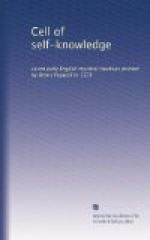Thus it seemeth that the virtue of discretion needeth to be had, with the which all others may be governed; for without it all virtues are turned in to vices. This is Joseph, that is the late born child, but yet his father loveth him more than them all. For why, without discretion may neither goodness be gotten nor kept, and therefore no wonder though that virtue be singularly loved, without which no virtue may be had nor governed. But what wonder though this virtue be late gotten, when we may not win to the perfection of discretion without much custom and many travails of these other affections coming before? For first behoveth us to be used in each virtue by itself, and get the proof of them all serely,[101] ere we may have full knowing of them all, or else can deem sufficiently of them all. And when we use us busily in these feelings and beholdings before said, oft times we fall and oft times we rise. Then, by our oft falling, may we learn how much wariness us behoveth have in the getting and keeping of these virtues. And thus sometime, by long use, a soul is led into full discretion, and then it may joy in the birth of Joseph. And before this virtue be conceived in a man’s soul, all that these other virtues do, it is without discretion. And therefore, in as much as a man presumeth and enforceth him in any of these feelings beforesaid, over his might and out of measure, in so much the fouler he falleth and faileth of his purpose. And therefore it is that, after them all and last, is Dinah born; for often, after a foul fall and a failing, cometh soon shame. And thus after many failings and failings, and shames following, a man learneth by the proof that there is nothing better than to be ruled after counsel, the which is the readiest getting of discretion. For why, he that doth all things with counsel, he shall never forthink[102] it; for better is a sly man than a strong man; yea, and better is list than lither strength,[103] and a sly man speaketh of victories. And here is the open skill why that neither Leah nor Zilpah nor Bilhah might bear such a child, but only Rachel; for, as it is said before, that of reason springeth right counsel, the which is very discretion, understanden by Joseph, the first son of Rachel; and then at the first bring we forth Joseph in our reason when all that we are stirred to do, we do it with counsel. This Joseph shall not only know what sins we are most stirred unto, but also he shall know the weakness of our kind, and after that either asketh, so shall he do remedy, and seek counsel at wiser than he, and do after them, or else he is not Joseph, Jacob’s son born of Rachel. And also by this foresaid[104] Joseph a man is not only learned to eschew the deceits of his enemies, but also oft a man is led by him to the perfect knowing of himself; and all after that a man knoweth himself, thereafter he profiteth in the knowing of God, of whom he is the image and the likeness. And therefore it is that after Joseph




